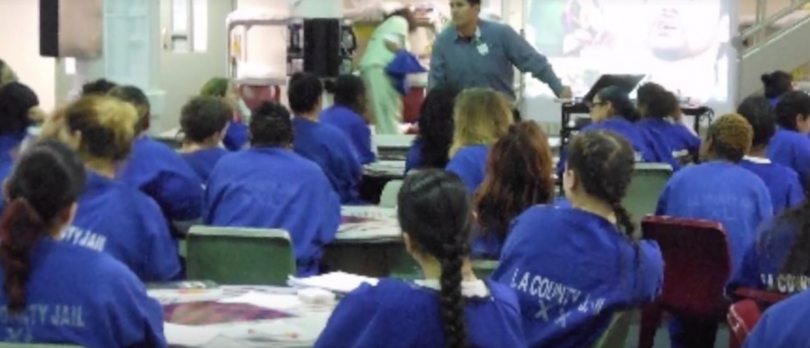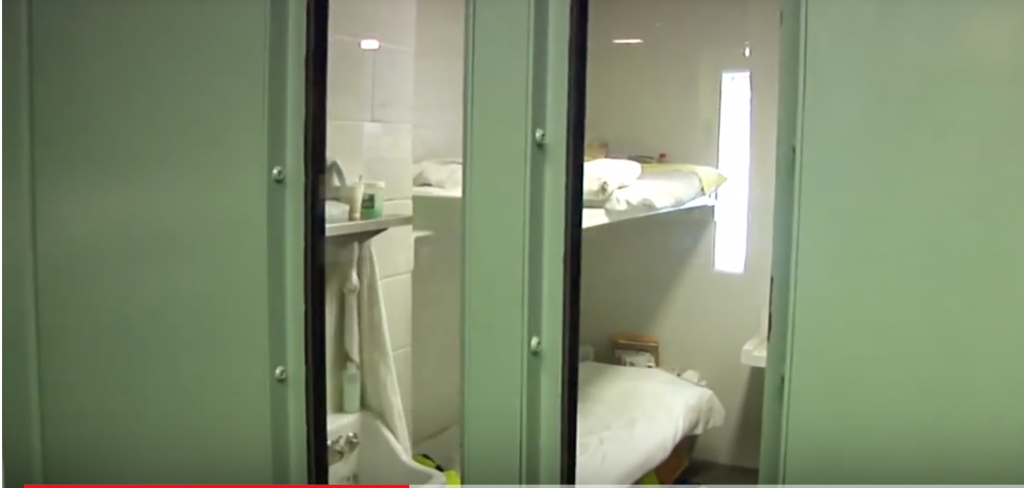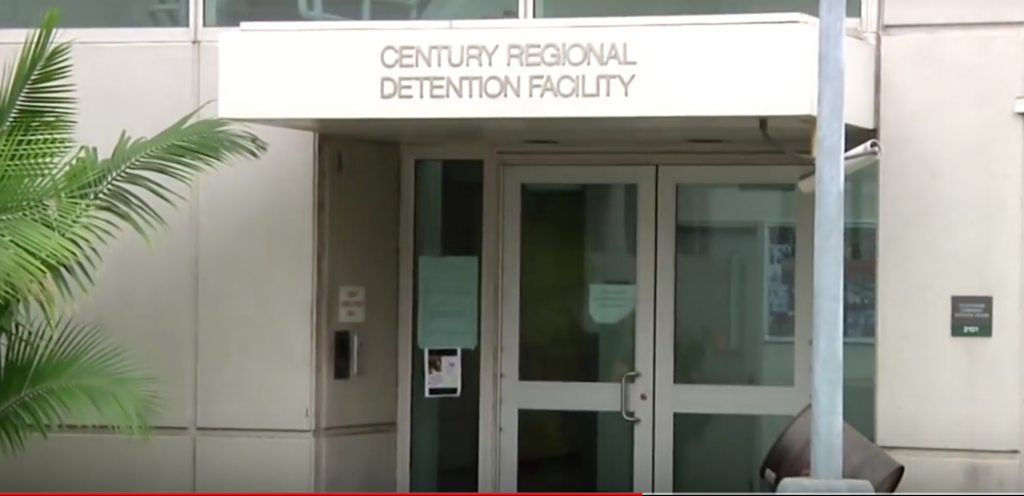In February of this year, a Los Angeles County Deputy named Giancarlo Scotti, who was working at the women’s jail located in Lynwood, California, was charged with sexually assaulting six female inmates at the facility where he worked.
The alleged assaults reportedly occurred between March and September of 2017. Scotti was originally charged for two of the alleged attacks in mid-September.
On October 29, 2017, two women who are former inmates of Lynwood jail brought a federal civil rights lawsuit against Scotti alleging in graphic terms that he forced a pregnant female inmate to have oral sex with him against her will, among other assaultive behaviors, and raped a second woman in the showers, after allegedly forcing oral copulation with her.
The complaint details how the second inmate reportedly managed to save some of the semen in a tissue to bolster her claim when she reported the incident. The pregnant inmate also reported her alleged assault.
The complaint also describes the ways in which both women claim they were severely retaliated against by deputies after they reported their allegations.
(You can read the complaint here.)
Now a preliminary audit, which looks at Prison Rape Elimination Act (PREA) compliance, has found that the same Lynwood-located Century Regional Detention Facility, or CRDF—the largest women’s jail in the nation—fails to meet 41 out of 43 national PREA standards needed to keep women inmates safe from the threat of sexual assault.
The highly critical 138-page audit, first obtained by the LA Times, was requested by the LA County Sheriff’s Department to help the department get up to speed on the PREA requirements.
Patti Giggans, who is a member of the Sheriff Civilian Oversight Commission, and also the executive director of the rape crisis center, Peace Over Violence, said she found it “shocking” that department failed so badly.
Amanda Goad, a senior Staff attorney for the ACLU of Southern California, told WitnessLA she found audit, which was recently made public, “very disappointing ” regarding what it revealed about “both big and small gaps” in the measures “the department should be taking” to protect people from sexual victimization.
Goad, whose work focuses on LGBTQ rights and improving conditions for incarcerated people, said she and her colleagues “understand that the department is has taken some positive steps,” she said. “It’s just that given the seriousness of the issue, particularly after the criminal charges were filed against the CRDF deputy last year—highlighting just how serious an issue this can be—we would like to see these problems addressed, not in the future, but right now.”
See-thru shower doors
Among the long list of problems cited by the auditors was the fact that some of the modules in the jail had showers that didn’t allow for the proper privacy for the women. For instance, in certain modules, the auditors described shower doors that were of a “cage design” instead of being frosted—meaning the when women took showers, they risked being visible to anyone passing.
But even in the modules with the frosted shower doors, the auditors found that the women’s body outlines were often still too clear to passing staff. And when those “saloon door” style frosted shower doors were in a module near a staircase, the auditors reported that personnel could see women showering without a problem, frosted door or no frosted door.
Matters were not helped, according to the audit, that although there appeared to be a policy in place requiring opposite sex staff to announce themselves when about to come into such areas as the showers, and or near to women’s cells, when the auditors were at the jail, “it was not evident that this was an institutionalized practice,” they wrote.
A faulty grievance process
Some of the most troubling issues the auditors discovered had to do with the grievance process. Inmates told the auditors that, in each of the housing units there was a secure locked box where women could deposit written grievances, including accounts of sexual abuse or harassment. That was the good news.
The bad news, the auditors discovered, was that as many as six sergeants had the task of retrieving grievances from the boxes, “including emergency grievances,” where the women felt endangered. As a consequence, inmates told the auditors, they were concerned about depositing grievance slips about sexual assault and harassment in the boxes for fear they would not “reach the proper channels given the broad access that any sergeant had to the box.” Worse, they were fearful that the grievances would be seen by the person about whom they were filing the complaint.
In a similar vein, inmates told of their worry about putting grievances into to the locked boxes at all for fear of retaliation.
Women who were segregated from the general population faced an even more difficult grievance process, wrote the auditors, since they were forced to ask an inmate “trustee” or a sergeant to bring them the grievance form. Then, once it was filled out, that same trustee or sergeant would have to take it and deposit it in one of the locked boxes, a process that didn’t feel very private or secure to the female inmates.
Several grievance slips the auditors saw were marked as emergency by the inmates who submitted them. They reviewed one such grievance, they wrote, that “alleged threats of immanent sexual abuse and physical violence by staff.” Yet the grievance had been subsequently marked “non-emergent” by a staffer, at some point the process, the auditors discovered. Yet no one could seem to explain why the grievance had been marked this way, and how it had been resolve. Plus there was no documentation of “any response from the facility despite the grievance alleging risk of immanent sexual abuse.”
In addition to the grievance forms, the auditors found that the inmates could anonymously report abuse problems via a special “Crime Stoppers” phone service that operates outside the jail system. To call Crime Stoppers, theoretically all an inmate had to do is dial *21 on any inmate phone. Unfortunately, according the auditors, during the days the team was present in the jail, despite many tries, no one could get the Crime Stoppers hot line to work from any inmate phone.
In short, based on what they’d seen, the auditors wrote, “grievances alleging sexual abuse are not addressed according to [PREA] standards.” Instead, they wrote, “the grievance process appears fraught with potential for inmates to be placed at risk for imminent sexual abuse and/or retaliation by the staff.”
The tip of the #MeToo iceberg in CRDF?
The ACLU’s Amanda Goad said that both the audit, and the allegations of sexual abuse against seven inmates by Deputy Scotti, suggest that a much larger PREA problem may exist below the surface in CRDF.
“We know,” she said, “both anecdotally from the conversations the ACLU staff have with folks in the jails in the course of our monitoring work, and also from broader studies of these issues, that the vast majority of people who do experience sexual victimization in jails never report it.”
It is analogous to how the #MeToo movement has played out in other contexts, Goad said, “where people underestimate the scope of how much damage that one perpetrator can do. Given the particularities of a jail setting and the dramatic power imbalance, its likely that a lot of people are experiencing problems that they are not reporting, and that they are not able to report, which is one of the things that the audit addresses.”
Lack of access
The auditors too were concerned that, even given all they had observed, they weren’t seeing the full picture at the jail. They were unhappy that the sheriff’s department would not give them “unfettered” access to the jail’s files they felt were important—including “investigative, personnel, medical, and mental health files” for the inmates.
This kind of access to onsite files, the auditors wrote “is key to conducting a performance based audit.”
The auditors particularly disliked that they could only read grievance files “briefly,” but were not allowed to make copies of any of the grievance material, according to the report, which they felt “obstructed” the team’s ability to “fully analyze evidence.”
Of the files and spreadsheets of the grievance cases they were given, the auditors found that, for the years of 2013, 2014,and 2015, when it came to PREA cases, they were given “blank pages.” For 2016, there was “only partial information” when it came to PREA cases. The files for 2017 PREA cases were only slightly better, wrote the auditors.
So will the audit jumpstart progress?
The LA County Sheriff’s Department sees the audit, no matter how critical, as a positive and crucial step forward.
“We knew that our commitment to PREA compliance would be an enormous, complex but important undertaking for our jail system,” the department said in a statement. “This is why, for the past 5 years, we have been proactively collaborating with leading advocates such as the National PREA Resource Center and Just Detention International (JDI) which was one of the original staunch advocates for the passage of the Prison Rape Elimination Act of 2003, which was finalized as a rule by the DOJ in 2012.”
The preliminary audit was something the LASD had requested and, they refer to it a “mock audit” that was conducted “as part of a training exercise.”
The department, they said, “entered into the mock audit process asking for raw, unfiltered feedback,” and that is “exactly what we received.”
Their goal, they wrote “is to implement the corrective action measures recommended in the mock audit” so that when they are officially audited, “we will be in that top one percent of custody facilities that pass all PREA standards without the need for additional corrective action.”
The Los Angeles County Sheriff’s Department, they concluded, “is committed to the constitutional care of our inmate population and applying the best practices that set the national standard.”
LA County Supervisor Janice Hahn was not quite as upbeat. Last November Hahn authored a motion, co-authored by Supervisor Sheila Kuehl, which directed the LA County CEO, the sheriff’s department, and LA County Probation Department to report back in 90 days on funding possibilities for two PREA Compliance Units housed in the probation and sheriff’s Departments.
The motion also directed the Sheriff’s Civilian Oversight Commission, the Office of the Inspector General, and the probation department to report back in 90 days on progress made in developing plans for PREA compliance in jails and juvenile detention facilities including a complaint procedure for inmates.
At least some of the final versions of those reports still seem to be in progress.
“The inmates in our jails are not only in LA County’s custody, they are under our protection,” said Hahn to WLA via email on the topic of the PREA audit. “Every precaution should be taken to prevent women and men in detention centers from being raped or sexually assaulted. Implementing PREA standards has taken too long and must be made a priority.”
We agree.




Another day, another trove of evidence that McBuckles should humbly resign and retire quietly. It’s amazing how much damage one ego driven politician can do to one organization, and then have the audacity to think the department wants him for a second term.
Ok that above comment makes no sense. What does the disgusting culture that Tanaka and Baca intentionally created have to do with the current Sheriff? He’s not a greaf Sheriff but he’s not Tanaka/Baca.
Imagine if Sheriff McDonnel had taken charge of the dept. 3+ years ago and immedeately called for the PREA compliance audit at Century Det Facility, then acted without delay to fully implement all of the needed recommendations and reforms.
Maybe McDonnel could have done it like that – but where does that leave him today?
The local news media are not headlining stories about problems that were solved 2 years ago.
The press conference announcing the arrest of Deputy Scotti provided broad media coverage for McDonnel, who still has quite a ways to go in establishing the level of name recognition and face identification reached by Sheriff Baca.
Taking a delayed, incremental approach to cleaning up the problems works well for McDonnel, and it provides for the well-timed high exposure media events.
McDonnel was elected as the set of fresh eyes sent in from outside the Sheriff Dept.
Why rush to revamp the system under his stamp?
In terms of L.A. County election politics, that would only bring muted coverage and diminishing credit for problems already solved.
It would also leave him shouldering blame whenever negative revelations arise anew from within the department over which he is seen to project his total control.
He’s much better off to continue playing fresh eyes, thus earning wide positive exposure for arresting Scotti.
Then again when charges are filed on Scotti.
Then again when Sheriff McDonell calls a press event in late May 2018 to announce the roll out of his reforms at Century Detention to make it the most PREA compliant facility in the nation.
That should hit the headlines with enough good vibes to get McDonnel reelected on the first ballot in June.
OK, I see McDonnell has his cheerleaders now commenting on this forum. Baca and Tanaka had theirs, and they were easy to pick out. Marlin, the old saying is justice delayed is justice denied. And when that justice is delayed for the sole purpose of maximizing political exposure, as you so eloquently pointed out, then McDonnell is a bigger POS than previously thought.
The rapes occurred on Fresh Eyes’ watch, facilitated by the fact his inability to recruit new deputies has left the entire department severely understaffed, with the attendant diminished security for all. Tell Fresh Eyes to put that on his resume. Time and time again McDonnell has revealed himself to be the incompetent, corrupt fool that he is. Where are the crime stats for 2017? How about 2016? Not too rosy a picture to run for reelection with, right?
In terms of Los Angeles County election politics, McDonnell is just another nameless, faceless, incompetent bureaucrat who can’t do anything right. He lied repeatedly to the Board of Supervisors and the LA Times. He lobbied hard against SB 54, and the voters of LA will not forget that. His choice of elected officials willing to endorse him is a small pool getting smaller by the day, and both major political parties won’t touch him with a ten foot pole.
Voters don’t reward incompetence or corruption. McDonnell rewards both with the command staff he has surrounded himself with, I can tell.
So basically you’re betting that ALADS will not endorse “Big Jim”. Say it ain’t so.
The view from the public and the view from within LASD is a mixed bag concerning McDonnell. There has been some reform but that is an uphill battle. I wouldn’t exactly call McDonnell nameless but politics abound in Los Angeles. I notice that many in the Los Angeles Political Arena are connected and they’ll do whatever it takes to win.
I honestly cannot tell if this is satire.
Of course, there are the usual shrill posts about “McBuckles,” AKA “Big Jim.” Without recounting the litany of criminal capers that happened under Pitchess, Block, and Baca, let’s just agree that many mistakes were made in the past. Blaming McDonnell for Scotti’s abuses is misguided. A chief executive sets the tone, establishes expectations, and holds accountable those who fail to conform. He can’t hold our hands at every moment.
An old salt once taught me that there are two types of mistakes: those of the head and those of the heart. Mistakes of the head are the ones we make in the normal course of working. We’re imperfect people, and we screw up at times. It’s the mistakes of the heart that are of particular concern. Now, the subject of our little story here is Mr. Scotti. He was hired and trained to be a law enforcement officer. He knew, or reasonably should have known, that the contact he made with female inmates was pure felony conduct. Yet he did it over and over again – mistakes of the heart.
Yes, he had enablers – unwitting peers and supervisors who probably paid little to no attention to their work. They may have watched just a few extra minutes of TV instead of walking their floor, or maybe they just assumed everything was quiet and didn’t need their attention.
All this to say, blame the one responsible: Scotti. Put it all at his feet; he deserves it.
Sure, it’s easy to blame Scotti and sweep it under the rug. That’s what McDonnell is hoping, but reality is far more damning to him. He has swept a lot of things under the rug, things that are in his control. Directing his subordinates to satisfy the requirements of PREA should have been a top priority coming in, along with a laundry list of reform measures designed to clean house and reassure both the public and the department that he was serious.
He decided not to do anything, and that will be his downfall. Why should anyone vote for someone who failed to do the job he was hired to do?
Non sense from the mouth of non-sensical people
I have a love one who is in jail inmate at 11705 alameda streeet lynwood. Century regional detetion facility. I was also informed that she was a attack by a officer in the facility. From my understanding this has happen more then once.